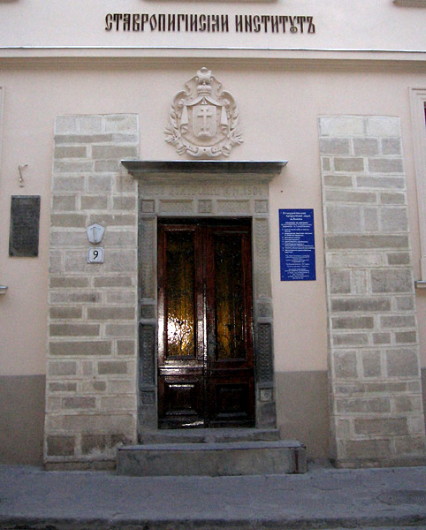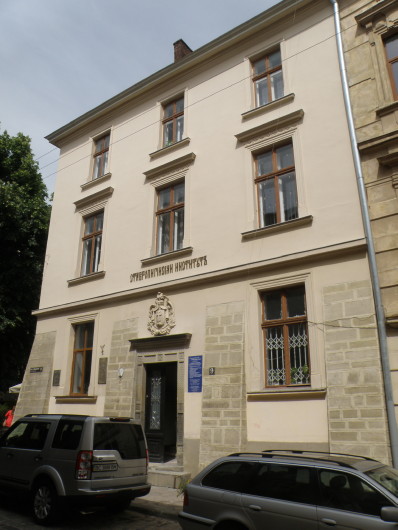Stauropegion Institute
Stauropegion Institute (Stavropihiiskyi instytut u Lvovi). A cultural-educational institution in Lviv; it remained the only such institution in Galicia until the mid-1800s. It was founded in 1788 on the directive of Emperor Joseph II on the basis of the Lviv Dormition Brotherhood. During the second half of the 19th century the institute was taken over by Russophiles. It was under the control of Ukrainophile populists for a short time after 1915. In 1922 Polish control was established in Galicia, and the directorship of the institute was restored to the Russophiles, who were willing to support the Polish government.
The institute was well endowed, with parcels of land and buildings in Lviv. It had its own printing press, bindery, and bookstore. It was active in the fields of education, scholarship, and publishing. In 1788 the Stauropegion Institute reopened the Lviv Dormition Brotherhood School and established a scholarship fund for elementary and secondary school students. In the early 19th century the institute published textbooks for elementary schools and secondary schools (including a spelling primer in 1807 and a Ukrainian grammar textbook) and for students of the Studium Ruthenum.
The institute's museum and archives were a valuable resource for scholars. The museum was opened in 1889, through the efforts of Antin Petrushevych and Isydor Sharanevych. Artifacts and documents dealing with the Dormition Church in Lviv, the archives of the brotherhood, and monastic life in Galicia formed the basis of the museum's holdings. The most valuable of these were original manuscripts: the Horodyshche Apostolos (12th century), the Horodyshche Gospel (13th century) the Peremyshl Gospel (16th century), the Nomocanon (15th century), Petro Mohyla's Knyha dushy, narytsaemaia zloto (The Book of the Soul Named Gold), the Lviv Chronicle, and Perestoroha. Other holdings of the museum included the archives of the Lviv Dormition Brotherhood; the original documents of Władysław Opolczyk (1375); grants, patents, and charters of Polish kings from the years 1522–1767; documents and letters of Moldavian princes concerning the Dormition Church in Lviv and the Lviv Dormition Brotherhood School and Lviv Dormition Brotherhood Press from the years 1558–1694; charters of the patriarchs of Constantinople from the years 1586–1670; old printed books (of special note were church books from the 15th–17th centuries, and the grammar Adelphotes, published in 1591); and objects of religious art. The museum's holdings were described by Ilarion Svientsitsky (1908) and I. Sharanevych (Ruskie Muzeum Instytutu Stawropigijskiego we Lwowie, 1937).
The institute gained control of the Lviv newspaper Zoria halytska in 1850 and continued to publish it until 1854, when it was once again taken over by Ukrainophiles. It published the valuable Ukrainian historical source Vremennik Stavropigiiskogo instituta s mesiatsoslovom (1864–1915, 1923–39) and the Zbirnyk Lvivskoï Stavropihiï (1921). In the 19th century, publications of the Stauropegion Institute were written in yazychiie; in the 20th century, in Russian.
The institute was administered by a council headed by a senior. I. Bachynsky (1801–16), I. Khomynsky (1861–6), Vasyl Kovalsky (1871–84), and Isydor Sharanevych (1885–1901) were among those who headed the institute. The total membership of the Lviv Dormition Brotherhood and the Stauropegion Institute for the entire period of its existence was 726.
The institute did not survive the Soviet occupation of 1939–41. In 1940 the holdings of the institute's museum were transferred to the Lviv Historical Museum, and its archives were taken over by the Central State Historical Archives of the Ukrainian SSR in Lviv (see Central State Historical Archive in Lviv).
[This article originally appeared in the Encyclopedia of Ukraine, vol. 5 (1993).]

